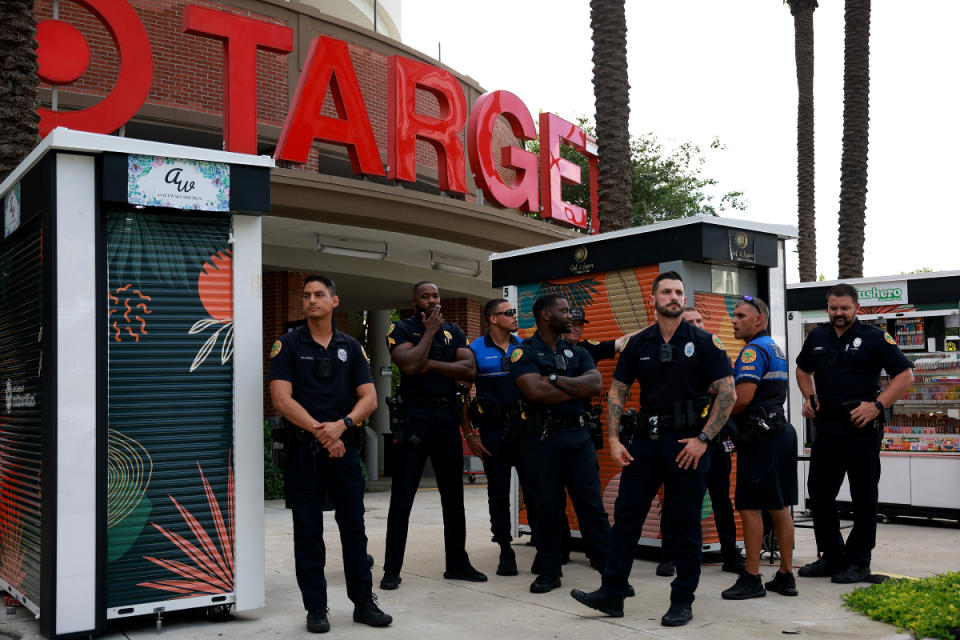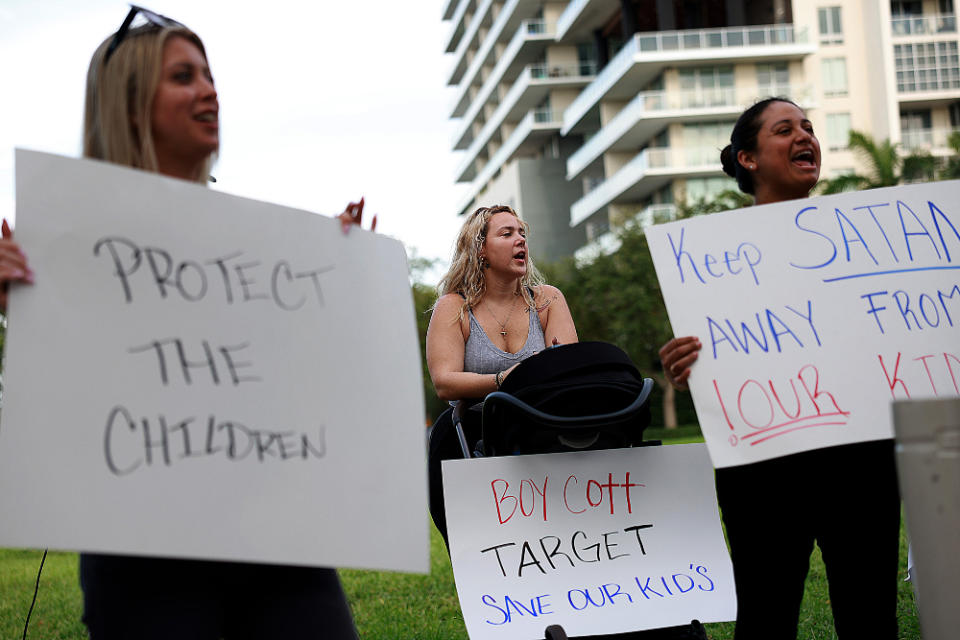15 Attorneys General React to Target’s Pride Month Reversal

While Target faces heat from state attorneys general for pulling Pride merch, 76 companies—including Levi Strauss & Co, Nike and Patagonia—are capping off Pride Month by committing to “stand proudly and publicly” as allies.
So far this year, state legislators have proposed more than 525 anti-LGBTQ+ bills, more than 220 of which target transgender people, according to the Human Rights Campaign (HRC). That number includes more than 125 gender-affirming care bans, more than 30 bathroom bills and 45 drag ban bills. So far, 78 anti-LGBTQ+ bills have been enacting into law.
More from Sourcing Journal
Target's New Last-Mile Center Reaches 500,000 More Customers
Target Pulls Pride Products After 'Threats': 'This Is What the Bullies Want'
The HRC announced Monday that 76 corporations and small businesses had signed its “Count Us In” pledge. The signatories, which also included American Eagle Outfitters, Inc., Etsy, Ralph Lauren Corp. and REI Co-op, agreed to call on lawmakers “to abandon any efforts to discriminate and reject anti-LGBTQ threats to company values of diversity, equity and inclusion [DEI].”
The pledge included a promise to “raise up honest and authentic experiences of LGBTQ+ Americans,” especially those who are transgender and non-binary, as well as a commitment to ensure transgender and non-binary employees and their families have access to the health and medical care they need, where possible under the law. Though many corporations offer coverage for gender-affirming care, their policies will often exclude care long recognized as potentially medically necessary, including hair removal, facial feminization surgeries and voice training. These gaps can leave employees on the hook for tens of thousands of dollars in medical bills.
“A growing number of companies are here to join with our community and let the bullies know that they haven’t won in the past, so they won’t win now,” HRC president Kelley Robinson said in a statement. “They recognize that engaging with the LGBTQ+ community is critical to attract and retain quality employees, that inclusive marketing is critical to their future success, and that the current patchwork of laws restricting LGBTQ+ people’s freedoms harms their businesses.”
State AGs, designers, advocacy groups react to Target pulling Pride products

As politicians employ anti-LGBTQ+ rhetoric and misinformation to justify their policies, anti-queer sentiment has seen a resurgence in the U.S. Pride collections, influencer partnerships and DEI initiatives that previously drew little attention have become the focus of far-right commentators and activists, leading to boycotts, vandalism and violence. Far-right pundit Matt Walsh outlined the strategy on Twitter in April.
“Here’s what we should do: Pick a victim, gang up on it, and make an example of it,” he wrote. “We can’t boycott every woke company or even most of them. But we can pick one, it hardly matters which, and target it with a ruthless boycott campaign. Claim one scalp then move onto the next.”
Target recently became the focus of one such campaign, with customers harassing employees and destroying Pride signs. Citing “threats impacting our team members’ sense of safety and well-being while at work,” the Minneapolis-based retailer removed items it said were “at the center of the most significant confrontational behavior.”
Last week, 15 attorneys general joined together to send a letter to Target voicing concern that pulling merchandise sent a message to “those who engage in hateful and disruptive conduct” that “they have the power to determine when LGBTQIA+ consumers will feel comfortable in Target stores—or anywhere in society.” The letter, which commended Target for its “intention to keep its staff members and customers safe,” offered help in addressing “potentially criminal acts.”
“All our states have laws protecting against discrimination on the basis of sexual orientation and gender identity in places of public accommodation like Target stores,” the attorneys general wrote. “While these laws certainly do not create a legal obligation for retailers to offer any particular merchandise or create any particular displays, they do demand that customers be treated equally. In this context, we urge Target to be mindful of its obligations under these laws as it makes decisions as to how to respond to backlash against its Pride merchandise.”
Ash + Chess, one of the brands whose merchandise was pulled by Target, detailed its experience earlier this month, revealing that the retailer began backpedaling well before the backlash. In an Instagram post shared June 17, the brand said that in mid-April, it was informed that all its transgender-related items—except for a shirt saying “Trans People Will Always Exist,” which Target would eventually pull entirely—would only be available online. “They claimed it had nothing to do with the anti-trans bills and political landscape going on in the country right now,” Ash + Chess wrote.
“It was really difficult to sit on this information,” the brand continued. “To hear that suddenly, after a year of hyping us up that these products would be so accessible and spread so much joy and awareness, the most important pieces were being moved to the internet. It was discouraged that we say anything about it, which felt confusing to us. We are ones to tell the truth and to stand up for our community. We told our friends and our family members about this unexpected turn in our collection. We felt like it was behind the scenes erasure of the trans community.”
In early to mid-May, Ash + Chess said, its children’s book was moved online “last minute” after stores had received inventory and started placing them on shelves. One customer tried to purchase the item, but the sale was refused since it had been changed to an online-only item, the brand wrote. It said Target did not communicate the change, and instead Ash + Chess only found out in a TikTok video from a customer who wasn’t able to complete the purchase in-store. Shortly after, the post claims, 16 Southern states “got orders to immediately move the Pride section from the front of the stores to the back of the stores.”
“It took about a week for news outlets and social media accounts to catch on to what was going on with the Target Pride collection,” Ash + Chess wrote. “We were in countless Zoom meetings, each one progressively worse, more and more disappointing news in each one. We were stressed, we were feeling terrible, we were tired the whole end part of May.”
On May 25, Ash + Chess had a meeting with Target where it said it was told 14 of the 16 items it created were removed from all U.S. Target stores. One of those items, the shirt that said “Trans People Will Always Exist,” was “completely erased from all shopping channels.” Target returned the rights to the designs Ash + Chess created exclusively for the retailer. “That felt like a win at least, that the artwork wouldn’t go to waste,” it said.

“It is the middle of June and it feels like this has all blown over already,” the brand wrote. “Target has stayed silent this entire time, despite us meeting with multiple higher-up[s], begging them to make a statement, only to be told that they were firm on their stance and will not be making a statement. No statement, no allyship other than the display of rainbows and ‘safe’ designs in their stores, no nothing.
“And there you have it. Target is banking on people forgetting about this. They already have Pride lined up for next year. We’re still thinking of ways that we can hold Target accountable.”
Erik Carnell, a trans designer whose use of occult imagery in unrelated, past products became a centerpiece of far-right attacks, saw all three of the items he designed for Target pulled entirely. Carnell, who sells products under the brand Abprallen, released a statement May 26 saying he was informed by one of Target’s distributors after the fact that his collection was to be removed. At the time of the statement, Carnell said he had not been contacted by Target “at all during the [entirety] of this fallout.”
Earlier this month, more than 200 LGBTQ+ and allied organizations came together to call on Target to put Pride merchandise back on the sales floor and online in full. They also asked Target to release a public statement reaffirming their commitment to the LGBTQ+ community and ensure the safety of its employees “on the front lines.”
“Extremist attacks and harassment of businesses for standing in solidarity with the LGBTQ+ community and values of diversity, equity and inclusion have challenged Target, and businesses more broadly, to lead – to demonstrate they mean what they say when investing in and standing with LGBTQ+ people, creatives, and organizations,” the statement read, in part. “Businesses must continue to lead and respond with unwavering support for LGBTQ+ employees, shareholders, customers, allies – and the broader community. When values of diversity, equity and inclusion are tested, businesses must defend them unequivocally.”
According to a recent poll from Ipsos and the LGBTQ+ advocacy group GLAAD, Americans are nearly twice as likely to say they would want to back companies facing criticism for supporting the LGBTQ community, rather than their critics. Nearly three-quarters are neutral or positively impacted by knowing a company offers Pride merchandise and two out of three are neutral to positive about in-store Pride merchandise. Fifty-nine percent of Americans believe companies with Pride merchandise are showing support and acceptance of the LGBTQ community, the poll also found.
“For decades, hundreds of major brands have and continue to support the LGBTQ community,” GLAAD president and CEO Sarah Kate Ellis said in a statement on the organization’s support for LGBTQ people, which was signed by 50 companies including Levi Strauss, Dow, Accenture and Salesforce. “Some recently experienced criticisms from anti-LGBTQ activists, but they refused to stand down. Those companies are not experiencing negative reputational or monetary impacts to their business. I am encouraged by the corporations who pledge to stand with us, not just during Pride, but all year long.”

